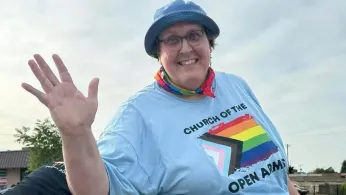
3 hours ago
Oklahoma Trans Woman Fired After Charlie Kirk Comments Faces Online Harassment and Suicidal Ideation
READ TIME: 3 MIN.
The recent assassination of Charlie Kirk, a prominent right-wing activist known for his anti-LGBTQ+ positions, triggered an outpouring of reactions across the political spectrum. Among those who commented was Paula Sofia Schonauer, then Director of the Counseling Center at Oklahoma City University and a transgender woman. Schonauer’s initial social media post expressed a complex mixture of feelings: a sense of "grudging satisfaction" at the death of someone she considered an architect of hate and "stochastic terrorism," paired with concern over gun violence and condolences for Kirk’s family .
Her post read: “As a target of Charlie Kirk, I must admit, there is a grudging satisfaction that one who has wielded hate and stochastic terrorism is getting a taste of his own medicine. As a citizen of the United States, I am appalled by gun violence, and I send to his family thoughts and prayers” .
This nuanced response did not shield Schonauer from swift backlash. After her comments gained attention, detractors rapidly descended on her social media profiles, subjecting her to a barrage of degrading remarks and death threats. Influential anti-LGBTQ+ social media accounts, including Libs of TikTok, circulated cherry-picked versions of her statement, doxxed her, and misgendered her publicly. These posts included personal details and prompted followers to contact her employer, Oklahoma City University, escalating the situation .
The online harassment soon reached Oklahoma City University administrators. According to Schonauer, the volume of calls and emails compelled the university’s Human Resources office to intervene. She was summoned to a meeting with her supervisor, who—despite previously downplaying the severity of her posts—confirmed that Schonauer was being terminated. The official letter cited selective phrases from Schonauer’s online statements, which she contends were taken out of context .
The university, while declining to comment on the specifics of her case, released a statement emphasizing its commitment to "respectful discourse and tolerance among our community members" and "high standards of conduct" for employees. The statement also expressed the institution’s ongoing dedication to fostering a "safe, welcoming, and affirming campus" but did not address the details of Schonauer’s termination .
The consequences of the doxxing and job loss were profound for Schonauer. She reported being pushed into a "death spiral" of depression and suicidal ideation, recalling previous trauma from her career in law enforcement, where she had faced harassment after coming out as transgender nearly three decades ago. Schonauer described how the onslaught of hatred and public shaming nearly led her to enact an old plan she had considered during those past struggles .
A turning point occurred when Schonauer received an unexpected act of kindness from a member of her community, which she credits with pulling her back from the brink. While details of the gesture remain private, Schonauer has spoken about the importance of compassion and support, particularly for marginalized individuals facing backlash and mental health challenges. The experience has prompted renewed calls from LGBTQ+ advocates for greater protections for transgender people in the workplace and online, and for increased resources to address the mental health impacts of coordinated harassment campaigns .
Schonauer’s experience is reflective of a broader pattern in which transgender individuals and other LGBTQ+ people face heightened scrutiny, harassment, and professional consequences for their online speech—especially when it involves political or controversial subjects. The incident comes amid ongoing national debates over freedom of expression, workplace discrimination, and the role of social media in amplifying targeted harassment.
Other transgender voices have called for unity and de-escalation in the wake of high-profile political violence. For example, Gigi Gandy, a transgender woman interviewed by FOX 11 Los Angeles, urged her community to avoid celebrating the deaths of adversaries and emphasized the risks of increased hostility toward transgender people following such events. Gandy’s comments highlight the dangers of retaliatory rhetoric and the need for compassion even amid deep political divides .
Scholars and LGBTQ+ advocacy organizations have warned that high-profile firings and public shaming can create chilling effects, deterring marginalized individuals from participating in public discourse. Furthermore, the incident brings renewed attention to the vulnerabilities faced by transgender professionals, who are often overrepresented in mental health statistics related to workplace discrimination and social exclusion .
The story of Paula Sofia Schonauer underscores the urgent need for institutional policies that protect employees from targeted harassment, support the mental health of marginalized groups, and uphold inclusive values in both digital and professional spaces. Schonauer’s ordeal has become a rallying point for those advocating for stronger workplace protections and greater awareness of the impact that coordinated online attacks can have on vulnerable individuals.
As the LGBTQ+ community and its allies reflect on this incident, the message from those directly affected is one of resilience, mutual support, and a reaffirmation of the need for empathy in the face of adversity .






